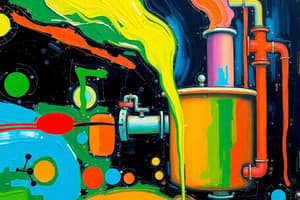Podcast
Questions and Answers
What is the primary basis for separation in filtration?
What is the primary basis for separation in filtration?
- Size exclusion (correct)
- Solubility in different liquids
- Difference in vapor pressures
- Difference in boiling points
What is the main purpose of understanding phase equilibria in separation processes?
What is the main purpose of understanding phase equilibria in separation processes?
- To separate components based on their solubility
- To partially vaporize a mixture
- To determine the boiling points of components
- To design and optimize separation processes (correct)
Which type of distillation uses steam to separate components?
Which type of distillation uses steam to separate components?
- Fractional distillation
- Flash distillation
- Simple distillation
- Steam distillation (correct)
What is the main advantage of flash distillation?
What is the main advantage of flash distillation?
Which type of phase equilibria is crucial for designing and optimizing distillation columns?
Which type of phase equilibria is crucial for designing and optimizing distillation columns?
What is the main purpose of LLE (Liquid-Liquid Extraction)?
What is the main purpose of LLE (Liquid-Liquid Extraction)?
Flashcards are hidden until you start studying
Study Notes
Separation Processes
Filtration
- A mechanical separation process used to separate solid particles from a fluid (liquid or gas)
- Based on size exclusion, where particles larger than the filter pores are retained
- Types of filtration:
- Gravity filtration
- Vacuum filtration
- Pressure filtration
- Applications:
- Solid-liquid separation
- Wastewater treatment
- Laboratory-scale separations
Distillation
- A thermal separation process used to separate components based on boiling points
- Based on the difference in vapor pressures of the components
- Types of distillation:
- Simple distillation
- Fractional distillation
- Vacuum distillation
- Applications:
- Petroleum refining
- Chemical processing
- Pharmaceutical production
Phase Equilibria
- The study of the equilibrium between different phases (solid, liquid, gas)
- Described by phase diagrams, which show the relationship between temperature, pressure, and composition
- Types of phase equilibria:
- Vapor-liquid equilibrium (VLE)
- Liquid-liquid equilibrium (LLE)
- Solid-liquid equilibrium (SLE)
- Importance in separation processes:
- Understanding phase equilibria is crucial for designing and optimizing separation processes
Volume Liquid Equilibrium (VLE)
- A type of phase equilibria that describes the equilibrium between a liquid and a vapor phase
- Described by the equilibrium curve, which shows the relationship between temperature, pressure, and composition
- Importance in distillation:
- Understanding VLE is crucial for designing and optimizing distillation columns
Flash Distillation
- A type of distillation where a mixture is partially vaporized and then separated
- Used for:
- Separating components with similar boiling points
- Deodorizing and dehydrating fluids
- Advantages:
- Fast and efficient
- Low energy consumption
Steam Distillation
- A type of distillation that uses steam to separate components
- Used for:
- Separating heat-sensitive compounds
- Extracting essential oils from plants
- Advantages:
- Gentle on the components
- Energy-efficient
LLE (Liquid-Liquid Extraction)
- A separation process used to separate components based on their solubility in different liquids
- Used for:
- Separating components with similar boiling points
- Purifying pharmaceuticals and chemicals
- Types of LLE:
- Single-stage extraction
- Multi-stage extraction
- Continuous extraction
Studying That Suits You
Use AI to generate personalized quizzes and flashcards to suit your learning preferences.




